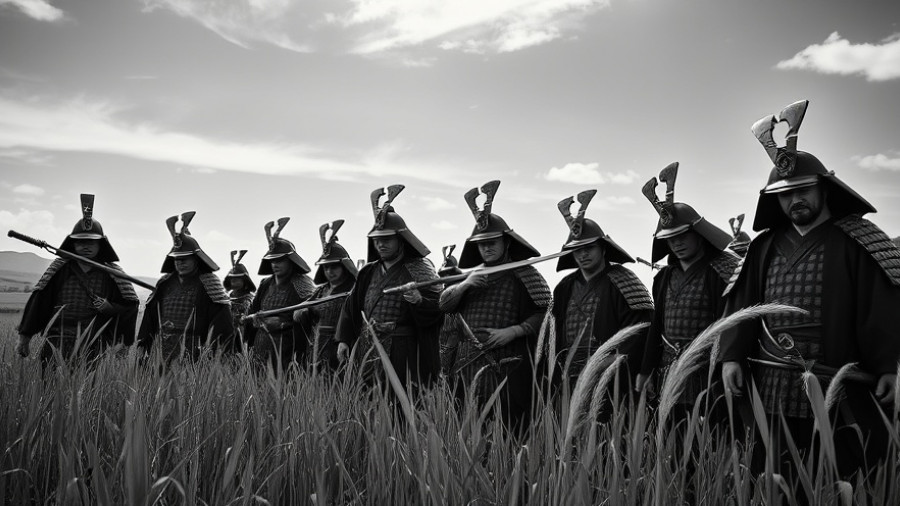
Understanding the Timeless Lessons from Seven Samurai
In a world that often glorifies individualism, the classic film Seven Samurai, directed by Akira Kurosawa, reminds us of the importance of teamwork, honor, and humility. First released in 1954, this cinematic masterpiece has influenced countless films and is regarded as a cornerstone of modern storytelling. It tells the tale of a poor farming village in 16th-century Japan being terrorized by bandits. In a desperate bid for survival, the villagers enlist the help of seven samurai, each bringing unique skills, personalities, and flaws to the table. Through their journey, we learn vital lessons not just about fighting, but about life itself.
Lead with Humility and Serve Others
The character of Kambei Shimada, the first samurai introduced in the film, embodies true leadership. Before he assumes his role as the group’s leader, he showcases humility by disguising himself as a monk to rescue a kidnapped child. This act of self-sacrifice sets the tone for his leadership style — one rooted in service and responsibility. In a modern context, this lesson resonates with the values found in the Bushido Code, which emphasizes serving others above one's own pride. By following his example, we can cultivate leadership qualities that inspire trust and respect among peers, not just in a time of crisis but in daily interactions.
Preparation Breeds Success
Throughout the film, the samurai emphasize the importance of preparation over recklessness. Rather than charging into battle, they spend time fortifying defenses, training the villagers, and studying their terrain. Echoing the words of military strategist Sun Tzu, Kurosawa illustrates that true courage is underscored by readiness. This principle is remarkably relevant today, where being prepared — both in the workplace and in personal life — often determines the outcome of challenges we face. By learning to "sweat more in preparation, bleed less in battle," we cultivate resilience and a proactive mindset.
The Strength of Quiet Professionals
A standout character in Seven Samurai, Kyūzō, exemplifies the ethos of the 'quiet professional.' He conveys strength and capability through his mastery of the sword, speaking more through action than words. In an era that values self-promotion and bravado, Kyūzō’s character teaches us that true skill is often understated. Embracing this sincerity can translate powerfully into any profession — acting confidently and competently without the need for loud affirmation.
Teamwork: A Collective Strength
The aphorism “When you are strong, I am strong” beautifully encapsulates the camaraderie among the samurai. Each member, though unique and flawed, comes together to form a cohesive unit when the stakes are high. This mirrors modern workplace dynamics where collaboration is key to overcoming challenges. We thrive not in isolation, but through mutual support. Just as Kambei emphasizes, “By protecting others, you save yourself,” this philosophy encourages giving strength to those around us — fostering teamwork that benefits the collective.
Honor and Legacy
In the film, the character Kikuchiyo exemplifies the pursuit of honor, despite his tumultuous past. His transformation into a true samurai serves as a reminder that one's beginnings do not dictate their destiny. Instead, through honor and noble actions, we craft our legacy. This is particularly relevant for men striving for personal growth — our past does not define us; our choices and actions in the present do. Understanding the significance of honor can motivate professionals to lead lives that reflect their values and earn respect.
Humor in Hardship
Despite their dire circumstances, the samurai maintain a sense of humor. Heihachi, the comedic relief, often uplifts the group's spirits through laughter, illuminating the power of humor in times of stress. This underscores the importance of light-heartedness in overcoming adversity, reminding us that maintaining morale can serve as a lifeline in tough times. Whether it’s in a challenging project at work or a serious life issue, a good laugh can ease the tension and foster a stronger community.
Live for Purpose, Not Reward
Throughout Seven Samurai, the samurai fight not for the rewards but for the sake of honor and purpose. They understand that some battles are fought not for personal gain but for the greater good. This notion challenges the contemporary mindset that often associates value with tangible rewards. Focusing on doing the right thing can be intrinsic motivation that not only enhances our personal satisfaction but also enriches our communities, workplace culture, and relationships.
Final Reflections: A Call to Action
Seven Samurai is more than just an action film; it's a philosophical guide on how to face life’s battles with honor and resilience. In a society that can often undervalue these teachings, it's vital to embrace the lessons learned from this classic. As we reflect on Kambei's humility and Kyūzō’s quiet strength, let us strive for personal growth and self-improvement. Now, it’s our turn to take action — to lead with honor in both our professional and personal lives. Challenge yourself to incorporate these lessons into your daily routine and watch how they transform your relationships, work ethic, and ultimately, your legacy.
 Add Row
Add Row  Add
Add 




Write A Comment